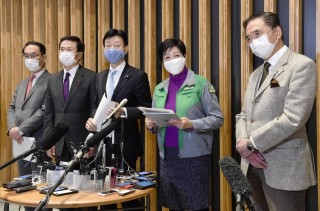Loading
Search
▼ Japanese Government Doubts Effectiveness Of Any Emergency Declaration
- Category:Other
Tokyo reported a Sunday record of 816 new COVID-19 cases, broadcaster TBS said, a day after Tokyo Gov. Yuriko Koike and the governors of three neighboring prefectures requested the central government to swiftly declare a state of emergency over the new coronavirus amid a recent surge in new cases.
The requests came after the country posted a record 4,520 new coronavirus cases on Thursday as the number of severely ill COVID-19 patients hit a new high of 716, straining the public health system to the brink of collapse in large metropolitan areas.
Despite the requests, the central government remains skeptical about whether a declaration would effectively curb the spread of the contagion.
The government is eager to prioritize the planned revision to the special measures law for tackling the pandemic in order to enhance the effectiveness of infection prevention measures, according to informed sources. The law revision, which the government hopes to enact by the end of the month, is likely to be aimed at introducing penalties on businesses that fail to follow authorities' requests to shorten operating hours.
"The government's decision to declare a state of emergency, if any, will come after the effectiveness of related measures is ensured under the revised law," an official close to Suga said.
Following a meeting with the four governors Saturday, economic revitalization minister Yasutoshi Nishimura, who is leading the government's coronavirus response, said the government "will consider the request" for an emergency declaration.
But at the same time, the minister indicated the government's position that it would carefully judge whether to make the declaration after hearing the opinions of experts at a meeting of a government subcommittee on the coronavirus response that will be held shortly.
The governors made the request for an emergency declaration as the COVID-19 outbreak in the Tokyo metropolitan area is showing no sign of abating. The declaration, based on the special measures law, would give prefectural authorities the power to take stronger measures, including issuing business suspension requests.
Since the beginning of a third wave of infections in the country, the government has been cautious about declaring a state of emergency, as the step would stop social and economic activities and have an impact on economic recovery.
In an example of the government's cautious stance, Prime Minister Yoshihide Suga stressed during a Dec. 25 news conference that people can change their behavior without an emergency declaration.
However, the number of new infection cases soared toward the New Year's holiday period, with the nationwide daily count topping 4,500 on Thursday, a record high.
Suga discussed with related Cabinet ministers what action should be taken on Dec. 31 and Jan. 1. On Saturday, he summoned senior health ministry officials to the Prime Minister's Office to get the latest information on the country's infection situation.
Even under such circumstances, the government is still ambivalent about declaring a state of emergency, believing that strongly requesting restaurants and other establishments to suspend their operations or shorten their business hours would be more effective in curbing the spread of COVID-19.
When Nishimura met with the four governors on Saturday, he once again sought the prefectural governments' cooperation in efforts to fight the epidemic.
Some within the central government are unhappy about how prefectures are responding to the spread of infections. "The Tokyo Metropolitan Government makes no move," an official related to the central government said. "The situation will not change even if a state of emergency is declared."
If the state makes the declaration by accepting the request from the prefectural governors, the public may perceive that the Suga government is admitting to failure with its coronavirus measures. Observers say such a development would inevitably serve as a fresh blow to the prime minister, who is already suffering from a fall in the approval rate for his Cabinet.
The government plans to speed up the work to draw up a bill to revise the special measures law so that it can be submitted to the Diet during an ordinary session expected to be convened on Jan. 18. The government hopes to have the revised law enacted by the end of this month.
- January 3, 2021
- Comment (0)
- Trackback(0)


